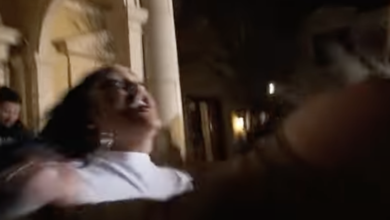Gaddafi Death Video: A Timeline Of Brutal Murder

The world watched in horror as the “gaddafi death video” surfaced, revealing the brutal final moments of Libya’s former leader, Muammar Gaddafi, in the midst of the country’s civil war. Join us on Chokerclub as we delve into the timeline of events leading to Gaddafi’s death, from the Battle of Sirte to his controversial killing, and explore the reactions and consequences that followed this pivotal moment in Libyan history.

I. Video Shows Rebel Fighters Abusing Gaddafi
Gruesome Video Surfaces
A graphic video emerged shortly after Gaddafi’s death, showing him being abused and humiliated by rebel fighters. The video, which was widely circulated online, sparked outrage and condemnation from international observers and human rights organizations. The footage showed Gaddafi being beaten, sodomized with a bayonet, and shot multiple times.
International Condemnation
| Organization | Statement |
|---|---|
| United Nations | “The Secretary-General condemns the killing of Muammar Gaddafi and calls for an immediate investigation into the circumstances of his death.” |
| Amnesty International | “The killing of Muammar Gaddafi is a violation of international law and a crime against humanity.” |
| Human Rights Watch | “The Libyan authorities must conduct an independent and impartial investigation into the killing of Muammar Gaddafi.” |
Implications of the Abuse
The video of Gaddafi’s abuse raised serious concerns about the conduct of the rebel forces and the potential for further human rights abuses in Libya. It also highlighted the need for accountability and justice for the crimes committed during the conflict.
II. International Law Violation

Contradictory Statements and Lack of Transparency
The circumstances surrounding Gaddafi’s death have been the subject of much debate and controversy. Initially, the National Transitional Council (NTC) claimed that Gaddafi died from injuries sustained in a crossfire during a rescue attempt by loyalist forces. However, a video that emerged later showed rebel fighters beating and sodomizing Gaddafi before he was shot several times. This video raised serious questions about the NTC’s account of events and led to accusations of a summary execution, which is a violation of international law.
Calls for an Independent Investigation
In the aftermath of Gaddafi’s death, several human rights organizations, including Amnesty International and Human Rights Watch, called for an independent autopsy and an investigation into the circumstances of his death. They argued that the video evidence suggested that Gaddafi had been subjected to torture and extrajudicial killing, which are both violations of international law. The United Nations Human Rights Council also expressed concern about the circumstances of Gaddafi’s death and called for an investigation.
Lack of Accountability and Ongoing Impunity
Despite the calls for an investigation, no independent inquiry has been conducted into Gaddafi’s death. The NTC has maintained that Gaddafi was killed in a legitimate military operation and has refused to cooperate with any international investigations. This lack of accountability has led to ongoing impunity for those responsible for Gaddafi’s death and has raised concerns about the rule of law in Libya.
| Organization | Statement |
|---|---|
| Amnesty International | “The video evidence suggests that Gaddafi was subjected to torture and extrajudicial killing, which are both violations of international law.” |
| Human Rights Watch | “The circumstances of Gaddafi’s death raise serious concerns about the NTC’s commitment to human rights and the rule of law.” |
| United Nations Human Rights Council | “The Council expresses concern about the circumstances of Gaddafi’s death and calls for an independent investigation.” |
III. Calls for Investigation

The circumstances surrounding Gaddafi’s death sparked widespread calls for an independent investigation. Amnesty International and Human Rights Watch expressed concerns about the lack of transparency and urged for a comprehensive probe into the events leading up to his killing. The United Nations Human Rights Council also called for an investigation into the incident. Despite these calls, no formal investigation has been conducted, and the exact details of Gaddafi’s death remain shrouded in controversy.
IV. Unlawful Killing

The circumstances surrounding Gaddafi’s death have been the subject of much debate and controversy. The National Transitional Council (NTC) initially claimed that Gaddafi died from injuries sustained in a firefight, but a video of his last moments shows rebel fighters beating him and one of them sodomizing him with a bayonet before he was shot several times. This video led to widespread condemnation of the NTC and accusations that Gaddafi had been unlawfully killed.
The United Nations Human Rights Council called for an independent investigation into Gaddafi’s death, and the International Criminal Court (ICC) is currently investigating the incident. The ICC has issued arrest warrants for several NTC officials, including the former prime minister, Mahmoud Jibril, and the former defense minister, Abu Bakr Yunis Jabr, on charges of war crimes and crimes against humanity.
| Date | Event |
|---|---|
| October 20, 2011 | Gaddafi is killed in Sirte. |
| October 21, 2011 | Video of Gaddafi’s death is released. |
| October 22, 2011 | UN Human Rights Council calls for an independent investigation. |
| November 14, 2011 | ICC issues arrest warrants for NTC officials. |
V. Conclusion
The death of Muammar Gaddafi marked a turning point in Libyan history, ending his decades-long rule and ushering in a new era of uncertainty and instability. The circumstances surrounding his death remain controversial, with questions lingering about the legality and morality of his killing. The aftermath of his death has been complex, with Libya facing ongoing challenges in establishing a stable and democratic government. Gaddafi’s legacy is a mixed one, with some Libyans remembering him as a strong leader who brought stability to the country, while others view him as a ruthless dictator who suppressed dissent and violated human rights. His death has had a profound impact on Libya and the region, and its effects will continue to be felt for years to come.








